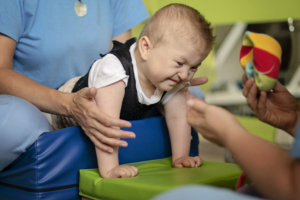
Identifying Muscle Weakness in Children
1. Baby turns head primarily to one side or head is tilting to one side.
2. Baby is not holding their head up by 4 months.
3. Baby declines to put weight through their legs by 6 months.
4. Baby is not sitting independently by 8 months.
5. Baby is not crawling by 12 months.
6. Baby is not walking by 18 months.
7. Child only walks on tiptoes for more than 6 months.
8. Child is w-sitting (sitting with legs turned out to the side forming a w)
9. Poor posture or slouched posture when sitting.
10. Unable to keep pace with same-age peers.
11. Overly clumsy child or trips often when walking.
Identifying Fine Motor Weakness in Children
1. Baby does not bring objects to mouth by 4 months.
2. Baby does not move objects from one hand to the other by 6 months.
3. Baby does not pick up small objects with three fingers by 9 months.
4. Baby does not bang items together by 12 months.
5. Baby does not put items in cup by 12 months.
6. Child does not stack more than 4 blocks by 2 years of age.
7. Child is not able to copy a circle by 3 years of age.
8. Child is not able to draw a person by 4 years of age.
9. Unable to cut out simple shapes by 6 years of age.
10. Unable to form most letters and numbers correctly by 7 years of age.
11. Unable to write legibly for the entirety of a story by 8 years of age.
Identifying Oral Muscle Weakness in Children
1. Preference for soft foods, refusal to eat chewy/ crunchy textures.
2. Drooling past the age of 18 months.
3. Choosing gestures over speech past the age of 18 months.
4. Difficulty or refusal to use a straw cup.
5. Not being able to understand at least 50% of a child’s speech at 2 years of age.
6. Not being able to understand at least 75% of a child’s speech at 3 years of age.
7. Slurred speech or deficits in articulation.
While this is a general overview of muscle weakness in children, if you think that your child has
muscle weakness you can contact Kids Place Therapy Services to request a free screening.
After the initial screening, the therapist can guide you through the next steps if therapy is
recommended for your child.
Reference
CDC. Milestone Moments. Retrieved from
https://www.cdc.gov/ncbddd/actearly/pdf/parents_pdfs/milestonemomentseng508.pdf

